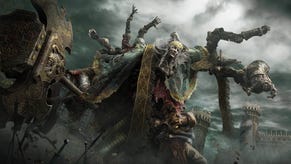Looking forward: games have a re-onboarding issue
Reward us for coming back, don't punish us for being away.
Hello! We're going to start the year off with a handful of pieces looking forward to 2022. Sometimes we'll be looking at trends we've spotted or themes that will probably be continuing to define things in games for a while. Sometimes we'll just be thinking about things we've enjoyed and where they could lead. Have a lovely new year all!
So, dilemma: the next-gen patch for Cyberpunk 2077 is nearly here - like, really nearly actually here after all this time. God, imagine if you'd waited for it before continuing your launch campaign! Oh hang on that's what I did. But don't worry about that Bertie! Don't worry that you bought a new console especially. We're going back and it will be wonderful, and there won't be a bug in sight.
Question is: do I start again or continue where I left off? That's my dilemma. You see, I don't remember what the hell I was doing in the game. I don't know if I have blade implants in my arms yet. I don't know what that sketchy samurai contact of mine is doing. I don't know what Keanu's up to (he's in The Matrix 4). In fact, I can't even remember how to play it. And you know what? I don't think the game cares. It probably won't even acknowledge I've been away. It'll just be - pop! - back to wherever I was in Night City and a screen full of indecipherable icons and 'off you go again'. It gives me the wobbles just thinking about it.
Games, I think, have a re-onboarding issue. They spend all this time easing us in, like toddlers into a swimming pool, but once we're happily floating, they walk off. They assume we're good forever now, bobbing around in their pool. But what if we go off for a hike? What if we go cycling? What if we come back and can't remember how to swim? There's no toddler ease-in now: only the murky depths of the deep end.
I'm making light of it but it's not the first time I've come across this issue, and I'm sure it's not for you, either. We live in a world where games are, generally, getting bigger and are more time-consuming than ever before. If one company can dominate your time, they're delighted. But who's got enough time or inclination to sit through epic after epic, especially when new ones keep coming along? It's much more likely you'll be partway through something and then leave it to jump on whatever totally hot new thing comes along. And then you'll find yourself in the same situation as me.
Well, I propose a radical solution! It's a time counter - we can just call it a clock if you like. And what it does is it counts (I think they get the gist of it Bertie) how long you've been away for, and if you pass a certain threshold, a re-onboarding process begins.

Take a breather, I know it's a lot to take in. But it's not really, is it? It's not really radical. Look at TV and all the recaps we get there. They are part and parcel of the experience, designed to get us back up to speed each week when a new episode comes in. Why can't we have something similar in games? Sprawling RPGs would benefit enormously from them. How many times have you logged back in only to look at your journal like it's written in gobbledegook?
Games have more to think about, of course. It's not just the story you'll be unfamiliar with when returning after a long break but the mechanics as well. There could be thematically in-keeping ways around this, though. Take Cyberpunk 2077 as an example. What if V was doing another virtual training module? That would make sense, and you could explain it as V keeping their skills sharp. I'm sure it wouldn't be that difficult to come up with a plausible scenario for every game. With enough effort, re-onboarding could even be something people enjoy, offering a glimpse at a wider world. After all, shouldn't you reward people for coming back rather than punish them for being away?
It's a long way of saying: Look, Ubisoft and Bethesda and CD Projekt Red and all you other big-game makers out there. I know you think the world of your games and believe we play them to the exclusion of everything else. But in reality, we've got all this other stuff going on, and all these other games. We might need to come back to it. So help us do that a bit more smoothly, would you? Lots of love, Bertie.


















